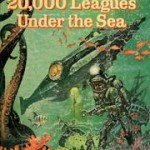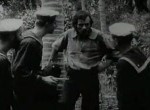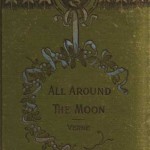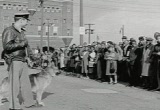Associated Press Story The books on our Open Library site.
Press release:

More than doubling the number of books available to print disabled people of all ages, today the Internet Archive launched a new service that brings free access to more than 1 million books — from classic 19th century fiction and current novels to technical guides and research materials — now available in the specially designed format to support those who are blind, dyslexic or are otherwise visually impaired.
“Every person deserves the opportunity to enhance their lives through access to the books that teach, entertain and inspire,” said Brewster Kahle, founder and Digital Librarian of the Internet Archive. “Bringing access to huge libraries of books to the blind and print disabled is truly one of benefits of the digital revolution.”
Kahle also announced that the Internet Archive will be investing in the growth of its virtual bookshelf by funding the digitization of the first 10,000 books donated. Individuals and organizations are welcome to donate their favorite book or a collection of books. Books in all languages welcome. To donate books visit: http://openlibrary.org/bookdrive
Dr. Marc Maurer, President of the National Federation of the Blind, said: “Blind people must have access to repositories of digital information if we are to reach our goal of becoming full and equal participants in society. Access to the books that have been scanned by the Internet Archive in a format accessible to the blind will be another step toward that goal. We are excited about continuing to work with Internet Archive to make access to more books a reality.”
The 1 million+ books in the Internet Archive’s library for print disabled, are scanned from hard copy books then digitized into DAISY — a specialized format used by blind or other persons with disabilities, for easy navigation. Files are downloaded to devices that translate the text and read the books aloud for the user to enjoy. To access books visit: http://openlibrary.org/subjects/accessible_book
Jessie Lorenz is a 31 year old woman who was born blind and is the Associate Director of at the Independent Living Resource Center in San Francisco. She believes, “Knowledge is power – and like everyone else, blind and print disabled people need equitable access to books to help them be innovative, productive, contributing community members.”
Older books are available from the Internet Archive’s unencrypted DAISY library and modern books can be accessed by “qualified users” through their NLS key — an encrypted code provided by the Library of Congress’ National Library Service for the Blind and Physically Handicapped (NLS), that is dedicated to providing materials to the print disabled. Currently, over 800,000 people in the US are registered with the Library of Congress as being print disabled.
As of today, the Internet Archive offers over one million books for print disabled people. Other large libraries for the print disabled including NLS, Bookshare.org, and Reading for the Blind & Dyslexic.
“This demonstrates why having open and public access to published works is so important,” said Kahle.
Ben Foss, President of Headstrong, an advocacy group for people with dyslexia said, “As dyslexic and print-disabled students scramble to complete their end-of-year research papers and projects, beginning today, there is a great new library of resources that will expand the tools these young people need to be successful in school and in life.”
By leveraging automated scanning and conversion processes, Internet Archive technicians can conduct a cost-efficient scan of more than one thousand books per day. Books are scanned at sites located in San Francisco, New York, Los Angeles and other major cities in five countries. Most of the older scanned books have been reformatted for the print-disabled from broad digitizing projects. Scanned physical books came from the collections of over 150 libraries, most of which are in the Open Content Alliance, but others as well. The funding of those scanning projects is coming from foundations, corporations and governments.
Most of the older books have been scanned from library collections, with newer books having been donated to the Internet Archive by companies such as the online bookseller Alibris, libraries and individuals.
The print disabled collection of books are now available through the Archive’s new Open Library site (www.openlibrary.org), which serves as a gateway to information about millions of hardcopy books and more than 1 million electronic books.
The Internet Archive will continually increase the number books it makes available. They are currently seeking donations of books and ebooks from individuals, libraries and publishers. The Archive is announcing today its commitment to fund the scanning and automatic processing of the first 10,000 donated books. Any organization or individual that would like to make particular books or collections available are encouraged to donate them by sending them to the Internet Archive. For donations of large collections please contact the Internet Archive. Financial support is also welcome to expand the program.
To access all books, a United States resident with print disabilities must register with the Library of Congress http://www.loc.gov/nls/signup.html .
###
The Internet Archive is a 501(c)(3) non-profit organization that was founded to build an Internet library. Its missions are to offer universal access to all knowledge and provide specialized services for adaptive reading and information access for the blind and other persons with disabilities. Internet Archive, 300 Funston Avenue, San Francisco California 94118, info@archive.org, www.archive.org, www.openlibrary.org, +1-415-561-6767.
Press contact: Pattie Haubner phaubner@douglasgould.com
(914) 833-7093, (914) 275-2984
MP3 clip of a talking book, and Jessie Lorenz with a talking book device. Photo 1 and 2 of Jessie working with archive staff on user interface.
USATODAY article: Millions of books get digitized for the disabled












